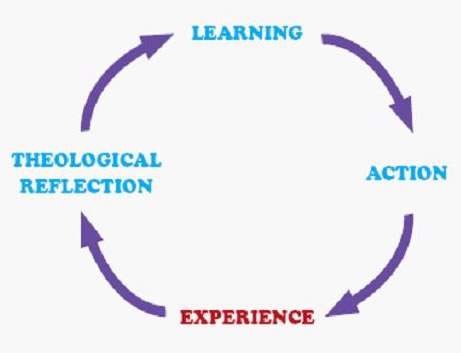
How to…..Use the Pastoral Cycle
Our ‘How To’ series is developed to help start/develop your justice and peace group and are all available on the resources page.
11. How to use the pastoral cycle.
A useful way of working to ensure a balance between reflection and action.
Experience:
We start from our own experience in order to be able to move on from there, sharing our own understanding and knowledge of a particular issue. This gives the group a foundation on which to build and plenty of opportunities to discuss its concerns and learn from other people’s experience.
Analysis:
Human beings are not creatures who live independently of other members of the human community and the natural world. We need to understand the structures of power which dominate the world we live in and the role we play in the structures which order human society, the links between our lives and the lives of the poor with whom we wish to be in solidarity. Thorough analysis needs to form the basis of our work, so that we will be able to identify instances where we may be participating unconsciously in the oppression facing marginalised peoples and the ways in which we can most effectively challenge that oppression.
Theological Reflection:
This is a very grand title for trying to discern what our faith has to say about the realities we face. Our work is concerned with putting faith into action, in participating in building God’s reign. We need to listen to the word of God, reflect on scripture, particularly through the eyes of the poor and marginalised. it is wise to remember that God’s place is in everything we are trying to achieve and not just in a particular place on the agenda. It is important to realise that the whole process – not merely the reflection – is a theological act.
Action:
The group has now to decide on what it wants to do or is able to do. The objectives the group or individuals set should be realistic and take into account the resources, talents and time available. It is important to have effective action so people don’t get frustrated. Starting small and developing activities is much better that constantly feeling that nothing is happening.
Celebration:
Whatever a group decides to do, celebrating achievements is vital and could be an opportunity to recruit new people to a campaign or concern. A group might like to have a special liturgical celebration with a bit of a party afterwards! Record your activities in a scrap book and include any newspaper-cuttings and photographs of your activities.
Evaluate:
What went well? What didn’t? What lessons were learned for next time?
New Experience:
You now have an enormous amount of experience on which to build. Do you want to continue working on the same issue or something else? How does the group feel about the way it is working? What is the next step?



